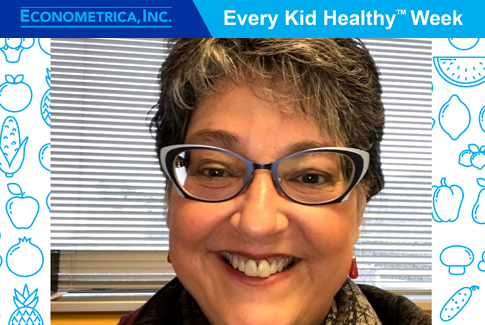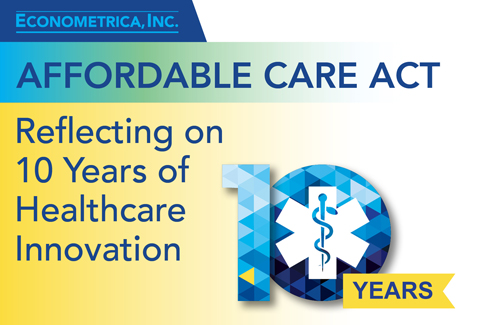March 1, 2021
Indiana University selected Econometrica to design and conduct focus groups to better understand how individuals and communities in the Midwest’s Industrial Heartland.

 BETHESDA, MD – To celebrate today’s Tasty Tuesday for Every Kid Healthy Week, we interviewed a pediatric Registered Dietitian. Carol
BETHESDA, MD – To celebrate today’s Tasty Tuesday for Every Kid Healthy Week, we interviewed a pediatric Registered Dietitian. Carol
Henderson, a member of Econometrica’s Health Group, is a pediatrics Registered Dietitian who has worked with children and teens and their families for dozens of years. In particular, she worked with infants and children with feeding and growth issues and children diagnosed with chronic conditions and diseases, such as cystic fibrosis, diabetes, juvenile arthritis, gastrointestinal disorders, and severe food allergies.
Interviewer: I wonder if you could tell us a little bit about what it is like working as a pediatric dietitian and what you want to accomplish when working with children and their families?
Carol: The primary goal when working as a dietitian with pediatric patients who are sick is to ensure adequate, proportional growth throughout childhood. Some children need to grow bigger and become stronger and some need to minimize their growth over time. Pediatric dietitians also evaluate a child’s activity level, daily schedule, parent/caregiver roles, timing of meals and mealtime environment, food availability, meal preparation, and sleep patterns to gauge an individual’s nutritional needs. These actions align with each of the daily themes we are celebrating during Every Kid Healthy Week:
Interviewer: How did you pick dietetics as a profession?
Carol: Dietetics found me! I was going to become a high school chemistry teacher. In college, I conducted my junior year teaching practicum in a local high school. A small group of students in one chemistry class thought it would be hilarious to capitalize on my untested teaching skills, so they combined all the reagents (acids and bases) that lined the lab benches and blew up the chem lab. Everyone evacuated safely and I stood in the middle of the chem lab while the sprinklers were raining down on me and said, “I don’t ever want to be a chemistry teacher!” Because chemistry is such an integral part of food science and dietetics, I found a new calling.
Interviewer: There are so many different paths you could have undertaken with a dietetics degree, why pediatrics?
Carol: My oldest sister had just completed medical school and she received her residency “match” at Cincinnati Children’s Hospital. At the same time, I completed my Dietetic Internship at the Mayo Clinic in Minnesota, so we moved in together. A dietitian position opened at Cincinnati Children’s and I became one of two dietitians for a 750-bed hospital. That would not happen today. Nowadays, a children’s hospital of the same size would have more than 35 dietetic staff members. It has been a great blessing to have worked with children, teens, and their families as a pediatric dietitian and patient advocate for many decades.
Interviewer: Carol, do you have any parting thoughts you would like to share today?
Carol: The greatest gift I have received from working as a pediatric dietitian is the importance of play. Play consumes all children. I think as adults we should consume more play in our lives!
Interview edited for length and clarity. Thanks to Emma Wellington for conducting this interview.
Founded in 1998, Econometrica is a research and management organization in Bethesda, MD, established to provide public- and private-sector clients with customized program support services. Econometrica works with multiple agencies to provide high-quality, cost-effective analyses, modeling, and economic evaluations. The company consistently receives exceptional scores from its clients and believes in three principles: technical capabilities, happy customers, and business development.
Preparing healthy meals for a family is an investment that not only requires time, commitment, but also a state of mindfulness—a sense of calm that is needed to prepare meals, even during chaotic family times.

 BETHESDA, MD – Econometrica launched a new course about handwashing during the COVID-19 pandemic. Washing your hands regularly and thoroughly is the best thing, aside from social distancing, that you can do to protect yourself and your community from the spread of COVID-19. Adapted from guidance from the Centers for Disease Control and Prevention, the new course will focus on when and how you should wash your hands to stay healthy – a simple task, yet often misunderstood and performed poorly.
BETHESDA, MD – Econometrica launched a new course about handwashing during the COVID-19 pandemic. Washing your hands regularly and thoroughly is the best thing, aside from social distancing, that you can do to protect yourself and your community from the spread of COVID-19. Adapted from guidance from the Centers for Disease Control and Prevention, the new course will focus on when and how you should wash your hands to stay healthy – a simple task, yet often misunderstood and performed poorly.
The new course is available at https://econometricainc.com/training/.
Founded in 1998, Econometrica is a research and management organization in Bethesda, MD, established to provide public- and private-sector clients with customized program support services. Econometrica works with multiple agencies to provide high-quality, cost-effective analyses, modeling, and economic evaluations. The company consistently receives exceptional scores from its clients and believes in three principles: technical capabilities, happy customers, and business development.
Washing your hands regularly and thoroughly is the best thing, aside from social distancing.

 BETHESDA, MD – In February, the Centers for Medicare & Medicaid Services (CMS) sponsored the CMS Quality Conference, an annual meeting of leaders and stakeholders dedicated to improving the quality, safety, and value of modern healthcare. Econometrica employees participated in this 3-day conference, which gathers the brightest in the field (including Government employees, providers, researchers, policymakers, professional society members, and others) to discuss several existing and future quality improvement initiatives. As the Affordable Care Act, the legislation that created many of these quality programs, celebrated its 10-year anniversary this March, the conference emphasized current and upcoming quality improvement programs. Econometrica has engaged with many of these models in the past; in this article, we highlight and look ahead to several key innovations discussed at the conference.
BETHESDA, MD – In February, the Centers for Medicare & Medicaid Services (CMS) sponsored the CMS Quality Conference, an annual meeting of leaders and stakeholders dedicated to improving the quality, safety, and value of modern healthcare. Econometrica employees participated in this 3-day conference, which gathers the brightest in the field (including Government employees, providers, researchers, policymakers, professional society members, and others) to discuss several existing and future quality improvement initiatives. As the Affordable Care Act, the legislation that created many of these quality programs, celebrated its 10-year anniversary this March, the conference emphasized current and upcoming quality improvement programs. Econometrica has engaged with many of these models in the past; in this article, we highlight and look ahead to several key innovations discussed at the conference.
The Quality Payment Program (QPP) was the focus of many conference sessions. Created under the Medicare Access and Children’s Health Insurance Program Reauthorization Act of 2015, the QPP aims to improve care and reduce costs while also easing provider burden. Clinicians may choose to participate via two tracks: the Merit-Based Incentive Payment System (MIPS), or Advanced Alternative Payment Models (APM). Through MIPS, clinicians are reimbursed based on quality of care as measured by performance in four domains: quality, cost, improvement activities, and promoting interoperability. Scores on measures in these domains are aggregated into a final score that determines a payment adjustment. Clinicians may also receive incentive payments for participating in an Advanced APM. APMs are payment frameworks that offer incentive payments for the provision of high-quality, cost-efficient care. Under the QPP’s Advanced APM option, a 5-percent incentive is available for clinicians who meet threshold levels of payments or patients through an Advanced APM.
Conference sessions highlighted CMS’ plans for implementation of the new MIPS Value Pathways (MVP) framework for participation in QPP beginning in the 2021 performance period. The goal of MVPs is to simplify and lower reporting burden. MVPs allow clinicians to report on measures and activities that are specialty- or practice-specific with a base of interoperability measures and population health measures derived from administrative claims data.
Other innovative models highlighted at the conference include the Integrated Care for Kids model and the Maternal Opioid Misuse model. The Integrated Care for Kids model aims to address challenges in children’s health through early identification and treatment of health issues and improved quality of care for children. It promotes care coordination across providers and creates State-specific APMs to enhance payment for quality of care and outcomes. Model participants include Lead Organizations, which are made up of community partners; State Medicaid Agencies; and Partnership Councils. The Maternal Opioid Misuse model is one of CMS’ models designed to respond to the opioid crisis by targeting the lack of coordination of care for pregnant and postpartum patients with Opioid Use Disorder. It further looks to increase access to necessary services and the availability of care providers for pregnant and postpartum women with Opioid Use Disorder.
Econometrica is excited to be part of such a vibrant conversation about the future of quality improvement! We look forward to continuing to work with CMS and other leaders in the field to drive healthcare innovations that promote the provision of high-quality care at efficient cost.
Founded in 1998, Econometrica is a research and management organization in Bethesda, MD, established to provide public- and private-sector clients with customized program support services. Econometrica works with multiple agencies to provide high-quality, cost-effective analyses, modeling, and economic evaluations. The company consistently receives exceptional scores from its clients and believes in three principles: technical capabilities, happy customers, and business development.
Econometrica is excited to be part of such a vibrant conversation about the future of quality improvement! We look forward to continuing to work with CMS and other leaders in the field to drive healthcare innovations that promote the provision of high-quality care at efficient cost.

 BETHESDA, MD – On March 23, the Patient Protection and Affordable Care Act (ACA) celebrates its 10-year anniversary. A landmark body of legislation, the ACA has left a lasting impact on healthcare in the United States. One of the key tenets of the legislation highlights its dedication to original and novel solutions to healthcare challenges: the creation of the Center for Medicare and Medicaid Innovation (CMMI), also known as the Innovation Center within the Centers for Medicare & Medicaid Services (CMS). In the past decade, the Econometrica Team has engaged with several CMMI programs designed to improve quality of care while reducing costs. We mark this milestone by reflecting on the past 10 years of work in this space and looking forward to future innovations.
BETHESDA, MD – On March 23, the Patient Protection and Affordable Care Act (ACA) celebrates its 10-year anniversary. A landmark body of legislation, the ACA has left a lasting impact on healthcare in the United States. One of the key tenets of the legislation highlights its dedication to original and novel solutions to healthcare challenges: the creation of the Center for Medicare and Medicaid Innovation (CMMI), also known as the Innovation Center within the Centers for Medicare & Medicaid Services (CMS). In the past decade, the Econometrica Team has engaged with several CMMI programs designed to improve quality of care while reducing costs. We mark this milestone by reflecting on the past 10 years of work in this space and looking forward to future innovations.
Since its inception through CMMI, Econometrica has been influential in the success of the Hospital Innovation and Improvement Network initiative, formerly known as the Partnership for Patients initiative. This initiative seeks to improve healthcare safety and quality by reducing harm in hospitals and reducing readmissions through public–private partnerships. In the first iteration of the initiative, Econometrica served as the National Content Developer. In this role, Econometrica supported Hospital Engagement Networks in identifying, sharing, and celebrating innovations in care redesign that improved patient outcomes and reduced readmissions in key areas (e.g., adverse drug events, early elective deliveries). Econometrica served as the evaluator for the initiative and investigated the savings and improved patient outcomes for the first and second iteration of the model. We have supported the third iteration of the model through our work monitoring Patient and Family Engagement activities and providing evidence-based resources on how to expand the innovation.
Econometrica supported CMS on the Medicaid Incentives for Prevention of Chronic Diseases program by monitoring the program’s effectiveness and providing technical support to participants. The demonstration program tested the effectiveness of offering incentives to Medicaid beneficiaries who took part in prevention programs to address one of the following health behaviors or outcomes: curbing tobacco use, controlling or losing weight, lowering cholesterol or blood pressure, and avoiding the onset of diabetes or improving diabetes management. Econometrica supported the 10 States that received grants in implementing the program, created and put into action a learning system, collected performance data, and organized meetings for grantees.
Another of Econometrica’s early CMMI initiative-related evaluation projects was the Evaluation and Monitoring of the Bundled Payments for Care Improvement Model 1 Initiative, which connected payments for services provided to beneficiaries during an episode of care. Econometrica evaluated changes in service utilization patterns, patient case mix, incidence of harm, quality of care, changes in key health outcomes of patients, and Medicare expenditures, and collected primary qualitative data by interviewing participants. We designed and administered a Patient Health and Experience Survey to certain beneficiaries to understand their care experience. We are currently building on this work under our Learning System for Bundled Payments for Care Improvement Advanced Model contract, in which we are researching and recommending which quality measures to use to evaluate participant performance in the model, responding to help desk tickets, and assisting with a data feedback dashboard that monitors model performance.
Our other current work on CMMI initiatives includes engagements with the Million Hearts® and Comprehensive Primary Care Plus (CPC+) models. Million Hearts® aims to reduce the risk of cardiovascular disease and improve outcomes for people at risk of heart attacks and stroke. Econometrica assists with the program implementation by validating beneficiary eligibility for the program, tracking provider use, and creating payment files for claims processing for each beneficiary.
Our work on CPC+ falls into two projects that support the model, which seeks to improve primary care through regional transformations of care delivery and multi-payer reform. Econometrica produces a series of data extracts consisting of claims and administrative data, which are sent to more than 300 individual practices participating in CPC+. We also aggregate data extracts that are provided to four regional aggregators participating in CPC+.
We look forward to continuing to support CMS’ dedication to innovative models that promote the delivery of high-quality healthcare at reduced cost. Happy birthday, CMMI!
Founded in 1998, Econometrica is a research and management organization in Bethesda, MD, established to provide public- and private-sector clients with customized program support services. Econometrica works with multiple agencies to provide high-quality, cost-effective analyses, modeling, and economic evaluations. The company consistently receives exceptional scores from its clients and believes in three principles: technical capabilities, happy customers, and business development.
Econometrica has been influential in the success of the Hospital Innovation and Improvement Network initiative, formerly known as the Partnership for Patients initiative. This initiative seeks to improve healthcare safety and quality by reducing harm in hospitals and reducing readmissions through public–private partnerships.

 BETHESDA, MD – On March 13, President Trump declared a national emergency in response to the outbreak of coronavirus (COVID-19) nationwide. Econometrica, Inc., continues to monitor developments related to the coronavirus pandemic to ensure the safety of our staff, their families, and communities. We also are taking steps toward meeting our commitments to clients and partners and continue to provide the high-quality and timely services expected from Econometrica.
BETHESDA, MD – On March 13, President Trump declared a national emergency in response to the outbreak of coronavirus (COVID-19) nationwide. Econometrica, Inc., continues to monitor developments related to the coronavirus pandemic to ensure the safety of our staff, their families, and communities. We also are taking steps toward meeting our commitments to clients and partners and continue to provide the high-quality and timely services expected from Econometrica.
The following summarizes steps we have taken to date:
Coronavirus infections increase at an exponential rate, with symptoms including fever, cough, and shortness of breath. Social distancing seems to be effective in reducing the spread, and Econometrica wants its employees to feel safe and remain healthy. As this outbreak unfolds, Econometrica will continue to provide its high-quality services with no reduction in availability or commitment.
Founded in 1998, Econometrica is a research and management organization in Bethesda, MD, established to provide public- and private-sector clients with customized program support services. Econometrica works with multiple agencies to provide high-quality, cost-effective analyses, modeling, and economic evaluations. The company consistently receives exceptional scores from its clients and believes in three principles: technical capabilities, happy customers, and business development.
Coronavirus infections increase at an exponential rate, with symptoms including fever, cough, and shortness of breath. Social distancing seems to be effective in reducing the spread, and Econometrica wants its employees to feel safe and remain healthy.
March 1, 2021
Indiana University selected Econometrica to design and conduct focus groups to better understand how individuals and communities in the Midwest’s Industrial Heartland.
February 9, 2021
The CDC Foundation awarded Econometrica a contract to create e-learning courses focused around a variety of global tobacco control topics.
October 1, 2020
Econometrica has formed a dedicated Clinical Practice Team consisting of healthcare professionals from a variety of healthcare disciplines.